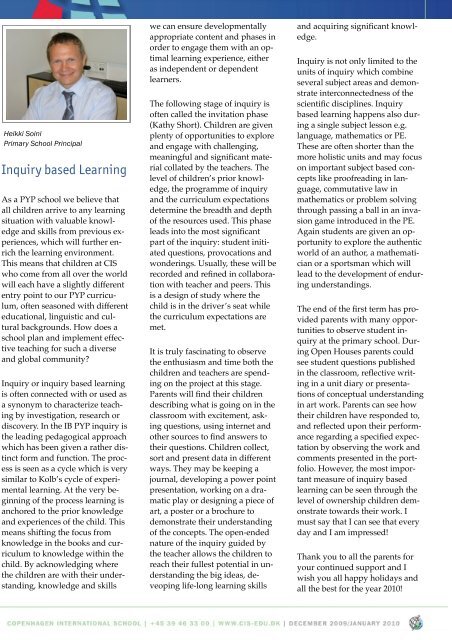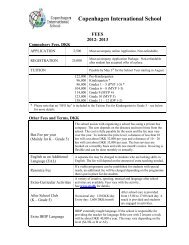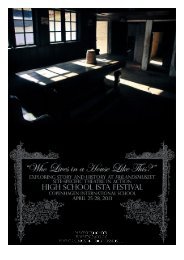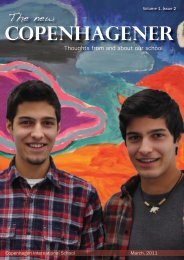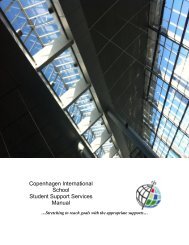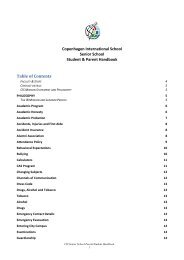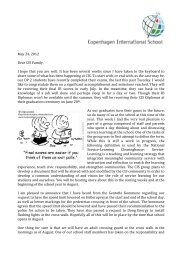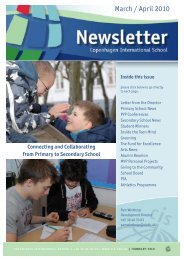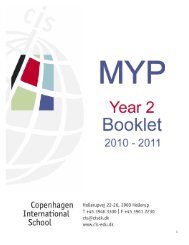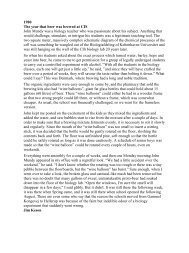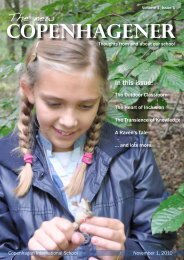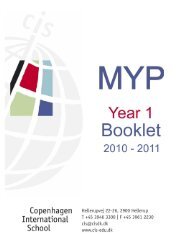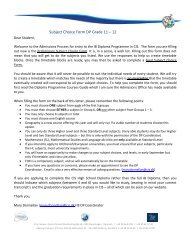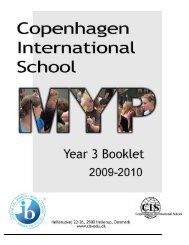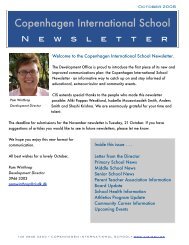01 - Copenhagen International School
01 - Copenhagen International School
01 - Copenhagen International School
You also want an ePaper? Increase the reach of your titles
YUMPU automatically turns print PDFs into web optimized ePapers that Google loves.
Heikki Soini<br />
Primary <strong>School</strong> Principal<br />
Inquiry based Learning<br />
As a PYP school we believe that<br />
all children arrive to any learning<br />
situation with valuable knowledge<br />
and skills from previous experiences,<br />
which will further enrich<br />
the learning environment.<br />
This means that children at CIS<br />
who come from all over the world<br />
will each have a slightly different<br />
entry point to our PYP curriculum,<br />
often seasoned with different<br />
educational, linguistic and cultural<br />
backgrounds. How does a<br />
school plan and implement effective<br />
teaching for such a diverse<br />
and global community?<br />
Inquiry or inquiry based learning<br />
is often connected with or used as<br />
a synonym to characterize teaching<br />
by investigation, research or<br />
discovery. In the IB PYP inquiry is<br />
the leading pedagogical approach<br />
which has been given a rather distinct<br />
form and function. The process<br />
is seen as a cycle which is very<br />
similar to Kolb’s cycle of experimental<br />
learning. At the very beginning<br />
of the process learning is<br />
anchored to the prior knowledge<br />
and experiences of the child. This<br />
means shifting the focus from<br />
knowledge in the books and curriculum<br />
to knowledge within the<br />
child. By acknowledging where<br />
the children are with their understanding,<br />
knowledge and skills<br />
we can ensure developmentally<br />
appropriate content and phases in<br />
order to engage them with an optimal<br />
learning experience, either<br />
as independent or dependent<br />
learners.<br />
The following stage of inquiry is<br />
often called the invitation phase<br />
(Kathy Short). Children are given<br />
plenty of opportunities to explore<br />
and engage with challenging,<br />
meaningful and significant material<br />
collated by the teachers. The<br />
level of children’s prior knowledge,<br />
the programme of inquiry<br />
and the curriculum expectations<br />
determine the breadth and depth<br />
of the resources used. This phase<br />
leads into the most significant<br />
part of the inquiry: student initiated<br />
questions, provocations and<br />
wonderings. Usually, these will be<br />
recorded and refined in collaboration<br />
with teacher and peers. This<br />
is a design of study where the<br />
child is in the driver’s seat while<br />
the curriculum expectations are<br />
met.<br />
It is truly fascinating to observe<br />
the enthusiasm and time both the<br />
children and teachers are spending<br />
on the project at this stage.<br />
Parents will find their children<br />
describing what is going on in the<br />
classroom with excitement, asking<br />
questions, using internet and<br />
other sources to find answers to<br />
their questions. Children collect,<br />
sort and present data in different<br />
ways. They may be keeping a<br />
journal, developing a power point<br />
presentation, working on a dramatic<br />
play or designing a piece of<br />
art, a poster or a brochure to<br />
demonstrate their understanding<br />
of the concepts. The open-ended<br />
nature of the inquiry guided by<br />
the teacher allows the children to<br />
reach their fullest potential in understanding<br />
the big ideas, deveoping<br />
life-long learning skills<br />
and acquiring significant knowledge.<br />
Inquiry is not only limited to the<br />
units of inquiry which combine<br />
several subject areas and demonstrate<br />
interconnectedness of the<br />
scientific disciplines. Inquiry<br />
based learning happens also during<br />
a single subject lesson e.g.<br />
language, mathematics or PE.<br />
These are often shorter than the<br />
more holistic units and may focus<br />
on important subject based concepts<br />
like proofreading in language,<br />
commutative law in<br />
mathematics or problem solving<br />
through passing a ball in an invasion<br />
game introduced in the PE.<br />
Again students are given an opportunity<br />
to explore the authentic<br />
world of an author, a mathematician<br />
or a sportsman which will<br />
lead to the development of enduring<br />
understandings.<br />
The end of the first term has provided<br />
parents with many opportunities<br />
to observe student inquiry<br />
at the primary school. During<br />
Open Houses parents could<br />
see student questions published<br />
in the classroom, reflective writing<br />
in a unit diary or presentations<br />
of conceptual understanding<br />
in art work. Parents can see how<br />
their children have responded to,<br />
and reflected upon their performance<br />
regarding a specified expectation<br />
by observing the work and<br />
comments presented in the portfolio.<br />
However, the most important<br />
measure of inquiry based<br />
learning can be seen through the<br />
level of ownership children demonstrate<br />
towards their work. I<br />
must say that I can see that every<br />
day and I am impressed!<br />
Thank you to all the parents for<br />
your continued support and I<br />
wish you all happy holidays and<br />
all the best for the year 2<strong>01</strong>0!


